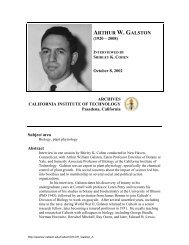Interview with David Baltimore - Caltech Oral Histories
Interview with David Baltimore - Caltech Oral Histories
Interview with David Baltimore - Caltech Oral Histories
You also want an ePaper? Increase the reach of your titles
YUMPU automatically turns print PDFs into web optimized ePapers that Google loves.
<strong>Baltimore</strong>-62<br />
BALTIMORE: And that’s another story. The virus was discovered, and it was clearly a<br />
retrovirus; but it was a new kind of retrovirus, nothing we’d ever seen before. So I was aware of<br />
all that, and actually had even suggested to Gallo to look for it once, before he found it. So I<br />
knew that world, and I knew about the controversies.<br />
LIPPINCOTT: You weren’t doing any work on it<br />
BALTIMORE: No, I wasn’t doing any work on it. My lab had moved largely into immunology<br />
by that time.<br />
LIPPINCOTT: Did you move over into the Whitehead Institute<br />
BALTIMORE: Yes, I moved to Whitehead in ’84, when it opened. I had a poliovirus group still<br />
and kept that through my whole career, but I had moved mostly to immunology. I also had a<br />
cancer virus group that was working on the Abelson virus, and that actually fed into the<br />
immunology, because Abelson virus transforms immune cells; so that was a core part of it. But I<br />
was thinking mostly about immunology.<br />
Walter Rosenblith was a Viennese who had come to the United States and worked in<br />
communications, information theory, and things of that sort at MIT. He had risen to be provost<br />
at MIT—was provost under [Jerome] Wiesner. Wiesner and Rosenblith built a lot of modern<br />
MIT. And I remember that I was at some event, and Walter, who was foreign secretary of the<br />
National Academy, came over to me and said, “The National Academy wants to start a<br />
committee to think about the national response to the AIDS epidemic, and they would like you to<br />
be co-chair.” This is 1985; it was when Reagan was president, and there was this homophobia<br />
that penetrated the whole government and they didn’t want to hear about AIDS. There was just a<br />
huge frustration in the scientific community because we knew this was a problem we could work<br />
on—a problem we could solve, though it turned out to be harder than anybody imagined. We<br />
wanted the government to institute a serious program of research, and many of us had been<br />
outspoken about that and had been just totally frustrated by the administration, which didn’t want<br />
to do it. So when Walter asked me to do this, I said, “It’s the last thing in the world I need!” On<br />
the other hand, I’m sort of born into it; I can’t get away from it. So Shelly [Sheldon M.] Wolff

















